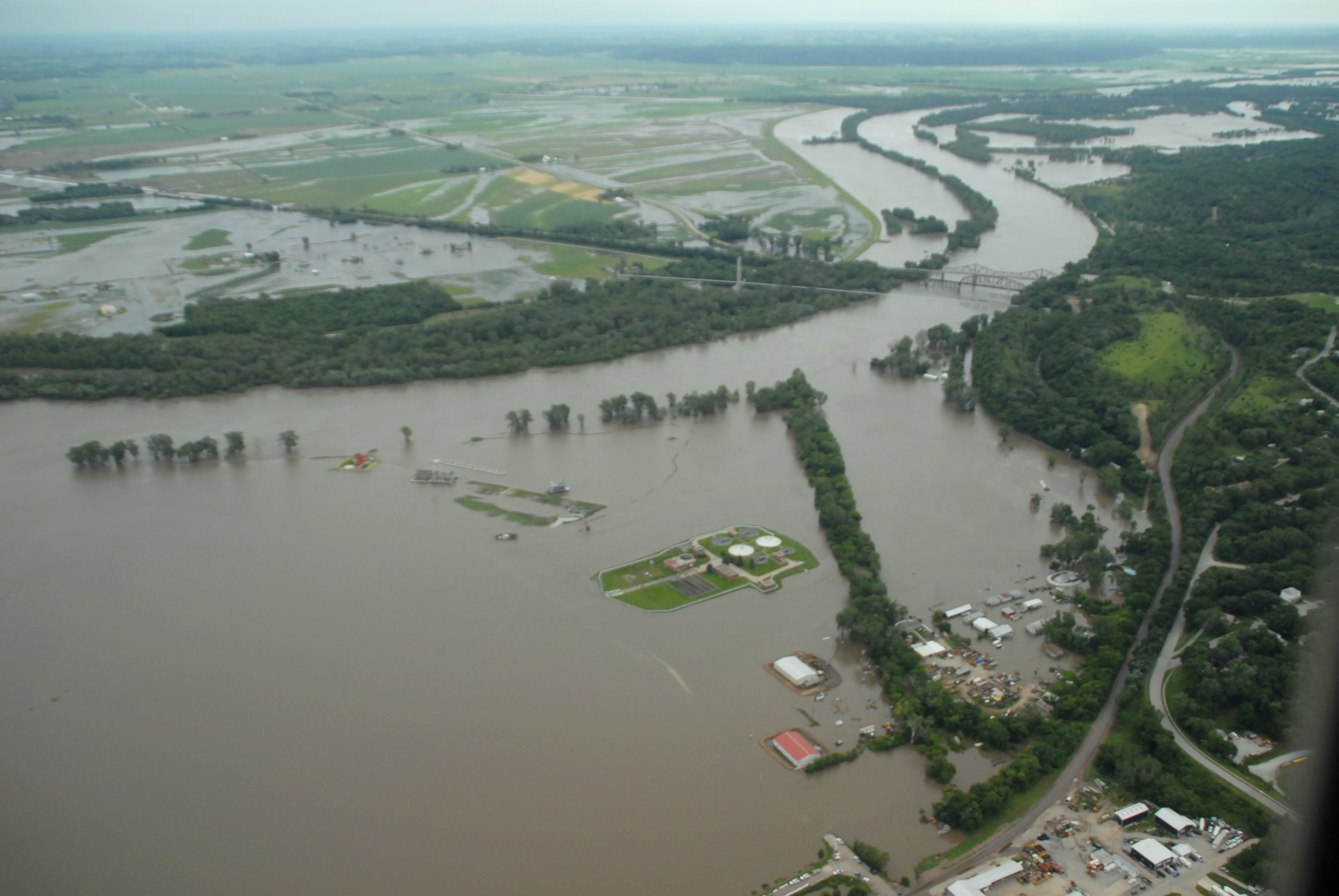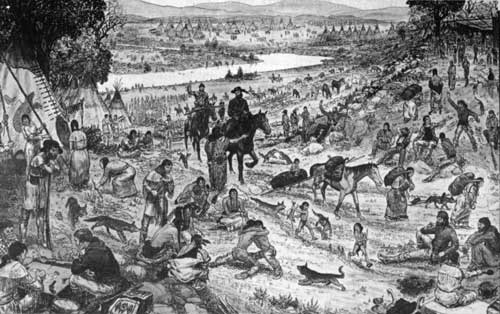|
Peter Sarpy
Peter Abadie Sarpy (1805–1865) was the French-American owner and operator of several fur trading posts, essential to the development of the Nebraska Territory, and a thriving ferry business. A prominent businessman, he helped lay out the towns of Bellevue and Decatur, Nebraska. Nebraska's legislature named Sarpy County after him in honor of his service to the state. Biography Peter A. Sarpy was likely born in St. Louis, Missouri on November 3, 1805. He was christened Pierre Sylvester Grégoire Sarpy, but he later anglicized his name. He also took his mother's maiden name, L'Abadie, using "A" for his middle initial. Peter's father was Grégoire Sarpy, who died in 1824. Peter had two brothers. The family was French Creole from Louisiana. They joined other ethnic French in migrating to the growing town of St. Louis after the Louisiana Purchase in 1803 by the United States. The lucrative fur trade and much of the economy of St. Louis was originally dominated by ethnic French fami ... [...More Info...] [...Related Items...] OR: [Wikipedia] [Google] [Baidu] |
Plattsmouth, Nebraska
Plattsmouth is a city and county seat of Cass County, Nebraska, United States. The population was 6,502 at the 2010 census. History The Lewis and Clark Expedition passed the mouth of the Platte River, just north of what is now Main Street Plattsmouth, on July 21, 1804. Plattsmouth first appeared in 1854 as "the Barracks", a trading post established by Sam Martin, owner of the Platteville ferry in neighboring Mills County, Iowa, ferryman Wheatley Mickelwait, and Glenwood, Iowa attorney and politician Colonel Joseph Longworthy Sharp. The community was renamed Plattsmouth for its location at the mouth of the Platte River, and was incorporated on March 15, 1855. The organization of the city under the charter of March 1855 was effected December 29, 1856, by the election of Wheatley Mickelwait to the Mayoralty, and Enos Williams, W. M. Slaughter and Jacob Vallery, Aldermen. This Council met and proceeded to business on January 29, 1857, their first ordinance, approved by the May ... [...More Info...] [...Related Items...] OR: [Wikipedia] [Google] [Baidu] |
Ponca
The Ponca ( Páⁿka iyé: Páⁿka or Ppáⁿkka pronounced ) are a Midwestern Native American tribe of the Dhegihan branch of the Siouan language group. There are two federally recognized Ponca tribes: the Ponca Tribe of Nebraska and the Ponca Tribe of Indians of Oklahoma. Their oral history states they originated as a tribe east of the Mississippi River in the Ohio River valley area and migrated west for game and as a result of Iroquois wars. The term ''Ponca'' was the name of a clan among the Kansa, Osage, and Quapaws. The meaning of the name is "Those Who Lead." Early history At first European contact, the Ponca lived around the mouth of the Niobrara River in northern Nebraska.Karr, StevenA Brief History of the Ponca Tribe.''The Official Website of the Ponca Tribe of Oklahoma.''. Retrieved 8 August 2009. According to tradition, they moved there from an area east of the Mississippi just before Columbus' arrival in the Americas. Siouan-speaking tribes such as the Omaha, O ... [...More Info...] [...Related Items...] OR: [Wikipedia] [Google] [Baidu] |
Henry Fraeb
Henry Fraeb, also called Frapp, was a mountain man, fur trader, and trade post operator of the American West, operating in the present-day states of Colorado, Wyoming, and Montana. __TOC__ Early life Fraeb, of German heritage, was from St. Louis, Missouri. Mountain man Fraeb trapped for beaver fur in the Rocky Mountain region, including Montana, where he is his considered one of the pioneering fur traders. He then was one of the owners of the Rocky Mountain Fur Company, along with Jim Bridger, Milton Sublette, Jean Baptiste Gervais, and Thomas Fitzpatrick. They bought the company in 1830 from the previous owners for $30,000, paying off the balance in three years. Although they were great trappers, they did not have experience in dealing with savvy, wealthy competitors. For instance, they had delayed shipments of furs back east, which resulted in cash flow and credit issues. Fraeb stated that he sold his partnership for $1,000 in merchandise, 40 horses, 40 traps, and eight guns. T ... [...More Info...] [...Related Items...] OR: [Wikipedia] [Google] [Baidu] |
Colorado
Colorado (, other variants) is a state in the Mountain West subregion of the Western United States. It encompasses most of the Southern Rocky Mountains, as well as the northeastern portion of the Colorado Plateau and the western edge of the Great Plains. Colorado is the eighth most extensive and 21st most populous U.S. state. The 2020 United States census enumerated the population of Colorado at 5,773,714, an increase of 14.80% since the 2010 United States census. The region has been inhabited by Native Americans and their ancestors for at least 13,500 years and possibly much longer. The eastern edge of the Rocky Mountains was a major migration route for early peoples who spread throughout the Americas. "''Colorado''" is the Spanish adjective meaning "ruddy", the color of the Fountain Formation outcroppings found up and down the Front Range of the Rocky Mountains. The Territory of Colorado was organized on February 28, 1861, and on August 1, 1876, U.S. President Ulyss ... [...More Info...] [...Related Items...] OR: [Wikipedia] [Google] [Baidu] |
South Platte River
The South Platte River is one of the two principal tributaries of the Platte River. Flowing through the U.S. states of Colorado and Nebraska, it is itself a major river of the American Midwestern United States, Midwest and the American Southwestern United States, Southwest/Mountain States, Mountain West. Its drainage basin includes much of the eastern flank of the Rocky Mountains in Colorado, much of the populated region known as the Colorado Front Range and Colorado Eastern Plains, Eastern Plains, and a portion of southeastern Wyoming in the vicinity of the city of Cheyenne, Wyoming, Cheyenne. It joins the North Platte River in western Nebraska to form the Platte, which then flows across Nebraska to the Missouri River, Missouri. The river serves as the principal source of water for eastern Colorado. In its valley along the foothills in Colorado, it has permitted agriculture in an area of the Colorado Piedmont and Great Plains that is otherwise arid. Description The river ... [...More Info...] [...Related Items...] OR: [Wikipedia] [Google] [Baidu] |
Fort Jackson (Colorado)
Fort Jackson was a fur trading post near the present-day town of Ione in Weld County, Colorado that operated from 1837 to 1838. It was one of the four trading posts along the South Platte River area. Nearby posts and competitors were Fort Vasquez, Fort Lupton, and Fort Saint Vrain. History It was built in the early part of 1837 near Platteville, Colorado City of Greeley Museums at a cost of $12,000 by Peter A. Sarpy and and partially financed by the Western Division of the |
Joshua Pilcher
Joshua Pilcher (March 15, 1790 in Culpeper County, Virginia – June 5, 1843 in St. Louis, Missouri) was an American fur trader and Indian agent. After the death of Manuel Lisa in 1820, Pilcher became the owner and president of the Missouri Fur Company, based in St. Louis. He was appointed US Superintendent for Indian Affairs (1838-1843) in the region after William Clark. Early life and education Pilcher was born in Culpeper County, Virginia. When he was five, his family moved to Lexington, Kentucky. Later, during the War of 1812, Pilcher moved to Saint Louis, a thriving town based on fur trading, located on the Mississippi River. Career He entered hatmaking in St. Louis. Then he became interested in the fur trade, the chief driver of the St. Louis economy. In 1819, he expanded his business to include fur trading, becoming a partner in the Missouri Fur Company. This had been started by French Creole families in St. Louis, and was later managed solely by Manuel Lisa. After Lis ... [...More Info...] [...Related Items...] OR: [Wikipedia] [Google] [Baidu] |
Keelboat
A keelboat is a riverine cargo-capable working boat, or a small- to mid-sized recreational sailing yacht. The boats in the first category have shallow structural keels, and are nearly flat-bottomed and often used leeboards if forced in open water, while modern recreational keelboats have prominent fixed fin keels, and considerable draft. The two terms may draw from cognate words with different final meaning. A keep boat, keelboat, or keel-boat is a type of usually long, narrow cigar-shaped riverboat, or unsheltered water barge which is sometimes also called a poleboat—that is built about a slight keel and is designed as a boat built for the navigation of rivers, shallow lakes, and sometimes canals that were commonly used in America including use in great numbers by settlers making their way west in the century-plus of wide-open western American frontiers. They were also used extensively for transporting cargo to market, and for exploration and trading expeditions, for wat ... [...More Info...] [...Related Items...] OR: [Wikipedia] [Google] [Baidu] |
Iowa
Iowa () is a state in the Midwestern region of the United States, bordered by the Mississippi River to the east and the Missouri River and Big Sioux River to the west. It is bordered by six states: Wisconsin to the northeast, Illinois to the east and southeast, Missouri to the south, Nebraska to the west, South Dakota to the northwest, and Minnesota to the north. During the 18th and early 19th centuries, Iowa was a part of French Louisiana and Spanish Louisiana; its state flag is patterned after the flag of France. After the Louisiana Purchase, people laid the foundation for an agriculture-based economy in the heart of the Corn Belt. In the latter half of the 20th century, Iowa's agricultural economy transitioned to a diversified economy of advanced manufacturing, processing, financial services, information technology, biotechnology, and green energy production. Iowa is the 26th most extensive in total area and the 31st most populous of the 50 U.S. states, with a populat ... [...More Info...] [...Related Items...] OR: [Wikipedia] [Google] [Baidu] |
American Revolution
The American Revolution was an ideological and political revolution that occurred in British America between 1765 and 1791. The Americans in the Thirteen Colonies formed independent states that defeated the British in the American Revolutionary War (1775–1783), gaining independence from the British Crown and establishing the United States of America as the first nation-state founded on Enlightenment principles of liberal democracy. American colonists objected to being taxed by the Parliament of Great Britain, a body in which they had no direct representation. Before the 1760s, Britain's American colonies had enjoyed a high level of autonomy in their internal affairs, which were locally governed by colonial legislatures. During the 1760s, however, the British Parliament passed a number of acts that were intended to bring the American colonies under more direct rule from the British metropole and increasingly intertwine the economies of the colonies with those of Brit ... [...More Info...] [...Related Items...] OR: [Wikipedia] [Google] [Baidu] |
Seven Years' War
The Seven Years' War (1756–1763) was a global conflict that involved most of the European Great Powers, and was fought primarily in Europe, the Americas, and Asia-Pacific. Other concurrent conflicts include the French and Indian War (1754–1763), the Carnatic Wars and the Anglo-Spanish War (1762–1763). The opposing alliances were led by Great Britain and France respectively, both seeking to establish global pre-eminence at the expense of the other. Along with Spain, France fought Britain both in Europe and overseas with land-based armies and naval forces, while Britain's ally Prussia sought territorial expansion in Europe and consolidation of its power. Long-standing colonial rivalries pitting Britain against France and Spain in North America and the West Indies were fought on a grand scale with consequential results. Prussia sought greater influence in the German states, while Austria wanted to regain Silesia, captured by Prussia in the previous war, and to contain Pruss ... [...More Info...] [...Related Items...] OR: [Wikipedia] [Google] [Baidu] |






